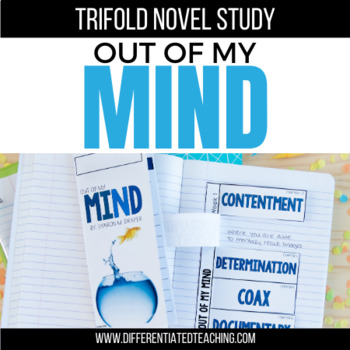Out of My Mind Novel Study: Literature Unit for the Book by Sharon Draper
- PDF
What educators are saying
Learning Objective
Students will be able to apply higher-level comprehension skills to understand and respond to literature using the novel Out of My Mind by Sharon Draper.
Description
This novel study for the book Out of My Mind by Sharon Draper will save hours of prep for literature circles and book clubs. Daily comprehension practice requires students to focus on text analysis and responding to literature, and the vocabulary focus builds word knowledge and academic vocabulary.
This no-fluff 5-week novel study for Out of My Mind is engaging for students, and it doesn't overwhelm your readers with countless chapter questions that just require them to regurgitate the text.
Standards-aligned & perfect for novel studies, small group book clubs or lit circles, independent reading, or as a way to monitor and via read aloud.
Skills addressed:
✔Character Relationships
✔Analyzing Text Quotes
✔Respond to Literature
✔Cause & Effect
✔Point of View
✔Symbolism
✔Summarizing
✔Inferring
And more!
Product Contents:
• Instructional planning guide
• 5 paper-saving novel study trifolds - up to 25 instructional days - color & blackline
• 5 weekly word of the day flip books for text-based vocabulary
• Matching cut & paste comprehension prompts for interactive journals
• Easy-to-follow directions for printing & prep
• Trifold Answer keys
Benefits of Trifolds over Traditional Novel Units:
❑ Foldable format provides novelty and encourages student engagement
❑ Daily comprehension focus builds reading comprehension skills vs. plot recall
❑ Less overwhelming to reluctant readers and writers
❑ Requires deep analysis and application of text-based knowledge
❑ Encourages discussion about skills & strategies
Download the preview to see what is included in this product and for photos of this product in action or check out this blog post to learn more: WHAT ARE TRIFOLD NOVEL STUDIES?
Get this title as part of a Build Your Own Trifold Novel Study Bundle.
*****************************************************************************
Terms of Use:
© Rebecca Davies. All rights reserved by the author. These materials are intended for personal use by a single classroom only. Copying for more than one teacher, classroom, department, school, or school system is prohibited. For use in multiple classrooms, please purchase additional licenses. This product may not be distributed or displayed digitally for public view. Failure to comply is a copyright infringement and a violation of the Digital Millennium Copyright Act (DMCA). Clipart and elements found in this PDF are copyrighted and cannot be extracted and used outside of this file without permission or license. See product file for clip art and font credits.
Questions?
Click here to contact me directly!





